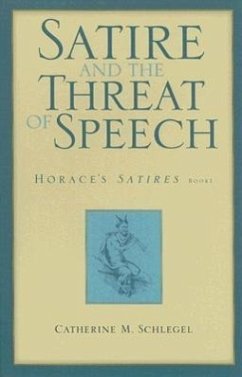In his first book of "Satires," written in the late, violent days of the Roman republic, Horace exposes satiric speech as a tool of power and domination. Using critical theories from classics, speech act theory, and others, Catherine Schlegel argues that Horace's acute poetic observation of hostile speech provides insights into the operations of verbal control that are relevant to his time and to ours. She demonstrates that though Horace is forced by his political circumstances to develop a new, unthreatening style of satire, his poems contain a challenge to our most profound habits of violence, hierarchy, and domination. Focusing on the relationships between speaker and audience and between old and new style, Schlegel examines the internal conflicts of a notoriously difficult text. This exciting contribution to the field of Horatian studies will be of interest to classicists as well as other scholars interested in the genre of satire.
Hinweis: Dieser Artikel kann nur an eine deutsche Lieferadresse ausgeliefert werden.
Hinweis: Dieser Artikel kann nur an eine deutsche Lieferadresse ausgeliefert werden.








